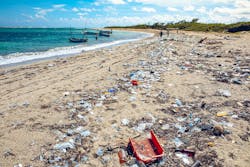A three-year effort by the United Nations to curb plastics pollution has ended without a global treaty agreement.
Many countries that do not produce plastics or the chemicals that go into plastics wanted limits on plastic production; countries that produce plastics — including the U.S. — rejected that in favor of improving worldwide recycling efforts.
It is unclear if there is a will to bring everyone back to the bargaining table again. Six sessions, which included an extra one after the planned five ended without an agreement, did not create much optimism.
It appears the industry might have missed an opportunity to show it can solve its own problems. That is a shame because muddling along as we are now doing won’t solve anything.
The Organization for Economic Cooperation and Development (OECD), which includes 38 countries with market-based economies, has estimated that without global action, plastic production will grow by 70 percent between 2020 and 2040. Less than 10 percent is currently recycled.
If that additional production forecast comes true without significant strides in converting waste back into useful plastic material, our children and grandchildren are going to inhabit a very unhealthy world.
The United Nations could probably call meetings for the next 20 years and still not get the plastics-producing countries to agree to production limits. A spokesman for the industry group Global Partners for Plastics Circularity said it is committed to keeping plastics in the economy and out of the environment.
The Biden administration supported a broad treaty; the Trump administration says it will only support a treaty that protects American business interests.
Plastic is so critical to the advancement of technology and innovation we must continue working on ways to use it more sustainably. There has been a great deal of innovation built on and because of the advances made in plastics. The industry needs to keep pushing the limits and capabilities of plastics.
I suppose we had to try for a grand, global treaty to end plastic pollution. It turned out that delegates from 170-plus countries could not agree on anything. A major criticism of the process was that organizers went for a consensus on every major point instead of voting on each one, then moving on to the next point.
A spokesperson for the United Nations Environment Program said countries need time to regroup. A seventh negotiating session is probably not the answer.
James Kennedy, a technology analyst at IDTechEx in the United Kingdom, wrote: “Despite this setback, momentum for change remains strong. Investor expectations, regional legislation and the growing competitiveness of recycled and biobased materials will continue to push the industry toward circularity. However, without the global treaty’s level playing field, the transition will be more fragmented, costlier and slower than it could have been.”
So, what next?
Individual countries need to start by developing national action plans. In the U.S., that would likely focus on the total life cycle of plastics, including nationwide programs to improve collection and recycling of all plastics, better product design to eliminate difficult-to-recycle plastics, recycled content requirements for some products and aggressive research on how to convert waste plastic back into useful material.
The high cost of recycling plastics often causes recycled material to be the same price or even more expensive than virgin resin. Arguments over the viability of mechanical vs. advanced recycling methods need to stop. We need both — as well as methods that have not yet been developed — to make the price of recycled materials competitive with virgin.
Some hard choices might have to be made. Do we eliminate single-use plastics wherever possible; do we ban some chemicals currently used in plastics; are new taxes needed to pay for an ambitious program?
In the U.S., we need a top-down approach. The federal government through mandates, funding initiatives and research, needs to lead the way. Fifty state-focused or thousands of community-focused programs won’t accomplish as much.
A global, enforceable treaty sounds great, but it is likely not going to happen. However, progress can be made if each of the 170-plus countries represented at the recent talks takes decisive action within its own borders.
There is a valid argument that many poor countries cannot afford aggressive, comprehensive programs to combat plastic pollution. The United Nations needs to figure out a way to help those countries find money to move forward.
Plastic pollution is a solvable problem, but probably not through a global treaty. Every nation doing a better job at home would be a good start.
Ron Shinn, editor
About the Author
Ron Shinn
Editor
Editor Ron Shinn is a co-founder of Plastics Machinery & Manufacturing and has been covering the plastics industry for more than 35 years. He leads the editorial team, directs coverage and sets the editorial calendar. He also writes features, including the Talking Points column and On the Factory Floor, and covers recycling and sustainability for PMM and Plastics Recycling.
